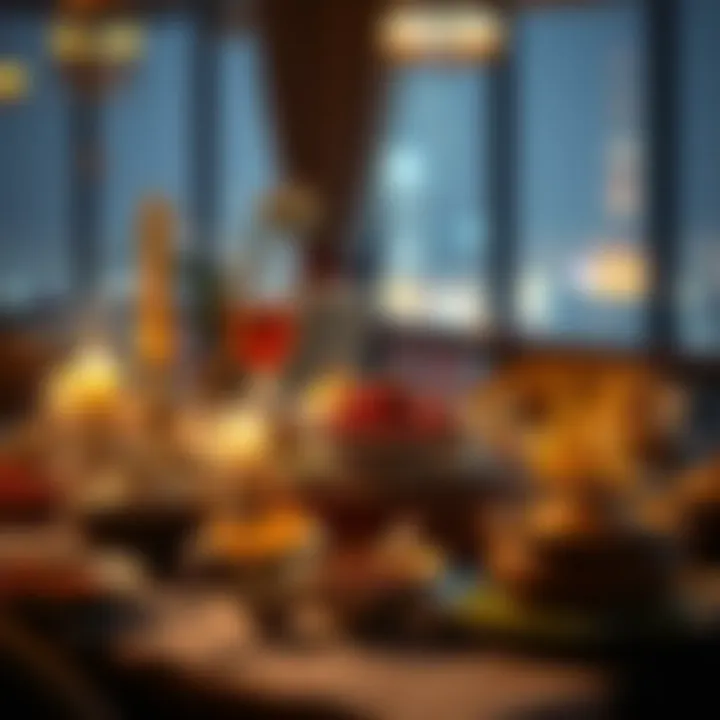Understanding Ramadan Timing in the UAE


Intro
Ramadan is not just a month; it embodies a profound transformation for Muslims around the world, including those in the UAE. As this sacred period approaches, understanding the timings associated with Ramadan is essential, as it impacts daily routines profoundly. In the UAE, the sweltering heat of summer further complicates the matter as fasting requires careful planning and understanding of local practices.
The dynamics of Ramadan timings in the UAE are shaped by a few factors, primarily the sighting of the moon, which is a traditional practice in Islamic culture. This data changes slightly across the seven emirates, each with its community practices and interpretations. During this month, residents experience changes in daily schedules, work hours, and cultural practices—adjustments that signify the deep reverence attached to the month.
In this article, we will take an in-depth look into the Ramadan timing, exploring how it is determined, variations across emirates, and its broader implications on daily life. Furthermore, we’ll touch upon cultural practices that enhance the spirit of the month, offering a close-up view of this sacred tradition.
"Ramadan is a time for gratitude, reflection, and community—a time when the stars shine a little brighter for those who look for them."
As we progress through this piece, expect detailed insights, drawn from both historical contexts and modern sensibilities, providing a window into the unique experience that is Ramadan in the UAE.
Prelims to Ramadan
Ramadan holds a unique place in the hearts of Muslims around the world, and in the UAE, it is no exception. This month is a period of fasting, prayer, reflection, and community. Understanding the significance of Ramadan is crucial for everyone, especially for investors, homebuyers, realtors, and analysts operating in the UAE. As this holy month influences the cultural fabric, it also shapes economic activities and social interactions. By grasping the essence of Ramadan, individuals and businesses can navigate its nuances effectively.
Historical Context
The history of Ramadan dates back to the 7th century when the Quran was revealed to the Prophet Muhammad. This month has been observed for centuries, marking a time of deep spirituality and a call to self-discipline. In the UAE, the historical connection to Ramadan is visible in various aspects of life. The Bedouin traditions, entwined with Islamic practices, show how communities have celebrated this period through elaborate feasts and communal gatherings.
The significance of Ramadan extends beyond mere fasting; it encompasses a full spectrum of cultural practices and traditions that have evolved over the years. From the early days of Islam, where fasting was a decree from Allah, to its contemporary observance that fosters unity, Ramadan's historical context enriches our understanding of its importance in today's society.
Religious Significance
Fasting during Ramadan is not just about abstaining from food and drink; it is a spiritual exercise designed to cultivate self-control, empathy, and a deeper connection to God. For many, it is a time for spiritual purification and renewal. Prayers and reflections become central to daily life, as Muslims engage in additional prayers known as Tarawih after the usual nightly prayers.
In a community-rich country like the UAE, the practices associated with Ramadan hold great religious significance. The emphasis on charity during this month is particularly noticeable, with individuals and organizations increasing their acts of giving. The concept of Zakat, or obligatory almsgiving, is heightened as people seek to cleanse their wealth by supporting the less fortunate.
Understanding Ramadan Timing
Understanding the timing associated with Ramadan in the UAE holds significant value for Muslims and non-Muslims alike. Ramadan is not merely a month of fasting but a deeply spiritual experience. Knowing the timing helps individuals prepare both physically and mentally. It guides daily routines during this sacred month and fosters a sense of community.
Accurate timing appears as a linchpin, especially as it dictates when fasting begins and ends, providing structure to the day. For residents and visitors alike, grasping these timings can enhance one’s appreciation for the culture and strengthen inter-cultural connections.
Definition of Ramadan Timing
Ramadan timing refers specifically to the daily schedule that marks the fasting periods established during the holy month. These timings are based on the lunar calendar, used to determine the sighting of the moon, which is paramount in Islamic tradition. In the UAE, as in many parts of the world, Ramadan timing consists of two distinct periods: the pre-dawn meal known as Suhoor and the evening meal, called Iftar.
The Suhoor period marks the time when Muslims can eat and drink before the fasting begins at dawn, specifically at Fajr. Conversely, the Iftar marks the end of fasting at sunset, precisely at Maghrib. Understanding these periods lays the groundwork for maintaining a healthy fasting practice throughout the month.
Fasting Periods
Fasting periods during Ramadan oversee a notable shift in daily life. The hours between Suhoor and Iftar can extend from about 14 to over 18 hours depending on the geographical location and time of year. In the UAE, the fasting duration varies slightly across different emirates and can be influenced by seasonal changes.
- Suhoor: Begins at a specified time before Fajr, typically around 4:30 AM to 5:00 AM.
- Iftar: Takes place just after Sunset, which is variously around 6:30 PM to 7:00 PM.
These timings create a rhythm for activities, encouraging individuals to partake in spiritual practices, seeking prayers, and gathering for communal meals.
Importance of Accurate Timing
Accurate timing during Ramadan is crucial for a multitude of reasons. First, precise timings ensure that one respects the guidelines of the fast. Missing Suhoor can lead to dehydration and fatigue during the long hours of fasting. Conversely, breaking the fast too early or late can affect both individual health and spiritual intention.
Furthermore, the community aspect of Ramadan enhances when everyone observes the same timings, creating shared moments during Suhoor and Iftar. Local mosques often play a pivotal role in communicating these timings, utilizing announcements via loudspeakers or distributing printed schedules.
As a significant bonus, many modern tools help simplify this aspect. Applications on smartphones or websites also provide real-time updates on UTC timings for both Suhoor and Iftar, allowing users to stay informed regardless of where they are.
Accurate timing not only facilitates personal adherence to the fast but also cultivates a collective experience that strengthens community bonds.


By delving into the specifics of Ramadan timing, individuals can navigate the month with clarity and intention, contributing to a spiritually uplifting experience.
Calculating Iftar and Suhoor
The timing of Iftar and Suhoor is crucial during Ramadan, serving as the anchor points of the daily fasting routine. Iftar, the meal taken at sunset, helps break the fast after a day of abstaining from food and drink. Suhoor, the pre-dawn meal, sustains the body for the long fasting hours ahead. Precision in calculating these times ensures that individuals adhere faithfully to the tenets of fasting, while also maximizing their spiritual and physical well-being during this holy month.
Role of Astronomical Calculations
Astronomical calculations play an important role in determining the timing of Iftar and Suhoor. Observers rely on the position of the sun as it sets and rises to accurately gauge when to break their fast and when to begin their next. One common method involves using solar angles, where a calculation is done to establish the exact time the sun sets below the horizon. Knowing this helps in mechanical devices or apps that alert practitioners to the precise moment of Iftar.
Local mosques often have this information readily available, but many also turn to mobile applications that use GPS data and astronomical algorithms to deliver timely notifications. These apps ensure users get accurate timings based on their specific locations within the UAE, considering minor geographic differences. This attention to detail highlights the seamless integration of technology and tradition, allowing both young and old to connect with their faith in a modern context.
Use of Prayer Timetables
In the UAE, use of prayer timetables is a standard practice among those observing Ramadan. Mosques typically publish these schedules, detailing prayer times and Iftar, which is calculated based on local astronomical observations. The timetables adjust slightly from month to month, aligning with the lunar cycle that defines the Islamic calendar and Ramadan in particular.
Residents often use these timetables in various ways:
- To plan meals well in advance
- To organize family gatherings for Iftar
- To align their daily routines around the prayer schedule
With prayer times printed in newspapers or available online, people have easy access to this essential information. Some may also prefer to subscribe to updates via local Islamic centers or through community groups on social media.
Whether one is new to Ramadan or has participated for many years, understanding these timings and the way they are calculated is vital. It not only enhances the experience of fasting but also reflects the cultural values of the community in which they partake.
Understanding the significance of accurate timing allows for a deeper connection to the fasting experience and enhances community engagement.
Ramadan Timing Across UAE Emirates
The experience of Ramadan is nuanced across the different emirates of the UAE. Each emirate grapples with unique cultural and practical considerations that shape how the timing of Ramadan is observed. Understanding these variations is not just a matter of religious significance; it has practical implications on daily life, business operations, and communal activities. For investors and homebuyers, awareness of these differences can enhance decision-making, particularly when considering property investments or retail businesses that may be influenced by local practices during this holy month.
Timing Variations in Dubai
In Dubai, the timing for suhoor (the pre-dawn meal) and iftar (the meal to break the fast) can differ slightly from other emirates due to its geographical position and urban landscape. The cosmopolitan nature of Dubai means that the city employs various methods to determine official prayer times.
Residents typically turn to local mosques or mobile apps to stay updated. For example, during the month of Ramadan, iftar might fall around 6:45 PM, while suhoor may need to be completed by 4:45 AM. Additionally, the vibrancy of nightlife during Ramadan in Dubai, combined with the cultural melting pot, affects how people perceive and participate in fasting times. Expectations of more flexible work hours for businesses not directly related to food and dining can often be observed, allowing both locals and expatriates to navigate through the month in a manner that suits their lifestyles.
Timing Variations in Abu Dhabi
Abu Dhabi presents its own distinct timing variations, influenced by a blend of tradition and modernity. Here, the local government exercises a level of oversight to ensure that prayer times are communicated accurately. Iftar can be expected to start around 6:50 PM, and suhoor is generally advised to wrap up by 4:30 AM.
Local communities often engage in elaborate iftar gatherings, and the timings are critical in ensuring that families come together to break their fast at the right time. In Abu Dhabi, residents also rely heavily on traditional sources such as mosque announcements for timings. This not only highlights a sense of community but also adds a rich layer to the observance of Ramadan in the capital.
Timing Variations in Sharjah
In Sharjah, the timing for suhoor and iftar aligns closely with those of Abu Dhabi, with slight adjustments due to its own unique geographical location. Typically, iftar timing rolls in around 6:48 PM and suhoor obligations are generally completed by 4:40 AM. The emirate is known for its strict adherence to Ramadan customs, and this extends to how timing is treated.
Sharjah's more traditional approach means that many families take time to educate younger generations about the importance of these timings. This observance is often accompanied by educational sessions in schools and community centers, reinforcing faith and respect for the practices of Ramadan.
Timing Variations in Other Emirates
The remaining emirates such as Ras Al Khaimah, Fujairah, Ajman, and Umm Al-Quwain also exhibit variations in Ramadan timings but often closely mirror those of the larger cities like Dubai and Abu Dhabi. Typically, iftar may range from 6:45 to 6:55 PM, while suhoor can run until approximately 4:30 to 4: 40 AM.
In these regions, the local customs reflect a traditional yet increasingly modern approach. Families gather in smaller groups but often enjoy the same sense of community during iftar as seen in bigger cities. Understanding these subtle timing differences is crucial for anyone involved in business ventures, especially those focusing on food and hospitality, as it allows for strategic planning.
Knowing the exact timing for suhoor and iftar across the emirates of UAE not only aids in the observance of Ramadan but plays a significant role in optimizing business operations and forging community ties.
Ultimately, the variations in Ramadan timing across the emirates of the UAE underscore a rich tapestry of cultural practices and communal values that can be leveraged for numerous economic and social relationships throughout the holy month.
Cultural Practices During Ramadan


Cultural practices during Ramadan hold deep significance in the UAE, encapsulating not just the religious aspects but also the rich tapestry of social connections and community engagement. Ramadan isn’t merely about fasting; it’s a vital period that fosters unity and compassion among individuals, making cultural practices even more compelling. The observance of traditions during this holy month reflects the values of generosity, family togetherness, and communal responsibility. These practices create a unique atmosphere that resonates through the streets, breaking the daily routine to establish a rhythm aligned with spiritual reflection and social bonding.
Community Iftar Gatherings
One of the most cherished cultural practices during Ramadan within the UAE is the community iftar gatherings. Families and friends often come together to share a meal at sunset, marking the end of the daily fast. Homes, mosques, and community centers turn into hubs of sharing, where the spirit of hospitality thrives.
- The significance: Iftar is an opportunity to strengthen bonds and partake in the communal spirit that characterizes this time. People often extend invitations to neighbors and even to those outside their circles, fostering connections that transcend personal relationships.
- Culinary diversity: These gatherings feature an array of traditional dishes, ranging from dates and qamar al-din (apricot juice) to rich biryanis and sumptuous sweets, celebrating the rich culinary landscape of the region.
- Inclusiveness: Community iftars often welcome individuals from various backgrounds, promoting understanding and appreciation of different cultures within the UAE, which is home to a plethora of nationalities.
The act of breaking the fast together offers an enriching experience, where conversations flow, laughter resonates, and a sense of belonging permeates the air.
Charitable Activities
In line with the values of generosity and giving that Ramadan embodies, charitable activities take center stage during this sacred month. Numerous initiatives are organized to assist those in need, reflecting the Islamic principle of zakat, or almsgiving.
- Feeding the needy: Many organizations and individuals engage in acts of feeding those less fortunate. Offering Iftar meals to the underprivileged has become a common practice, embodying the ethos of community support.
- Fundraising events: Throughout the month, fundraising efforts rise to aid educational projects, healthcare, and social services. Local charities and organizations actively solicit donations to help the less fortunate, showcasing the spirit of selflessness that characterizes Ramadan.
- Volunteerism: People often dedicate time to volunteer at food drives or community services, enhancing social responsibility. This involvement highlights the importance of giving back, reinforcing a cycle of kindness that transcends the individual.
These charitable activities during Ramadan not only address immediate needs but also instill a culture of empathy and support that can last beyond the holy month.
Family Traditions
Family traditions during Ramadan are another pillar of cultural practices, providing a setting for connection and shared experiences. These customs often reflect both personal family values and broader cultural norms within the UAE.
- Daily rituals: Families engage in daily rituals, such as the pre-dawn meal, known as Suhoor, where members gather for nourishment and companionship before the day of fasting begins. This time becomes precious, a moment to connect before the day unfolds.
- Ritual celebrations: Many families utilize this month to revisit cherished stories, pray together, and reflect on the teachings of Islam. This creates an environment of learning and sharing, where values are passed on and spirituality is nurtured.
- Final night observances: As Ramadan progresses, families may also prepare for Eid al-Fitr, the festival marking the end of fasting, transforming the atmosphere of anticipation into a festive spirit characterized by sweets, gifts, and community gatherings.
The End
In essence, cultural practices during Ramadan enrich the lives of individuals and communities in the UAE. They strengthen bonds, highlight the value of empathy, and enhance the communal spirit that is so essential during this sacred month. These traditions blend into the daily fabric of life, offering a profound opportunity for reflection and growth, making Ramadan not just a time of fasting, but a celebration of life and connection.
Impact on Daily Life
Ramadan is more than just a religious observance; it profoundly shapes daily life in the UAE. The dynamics of the month extend to business operations, social interactions, and travel, creating a unique atmosphere that affects everyone—from corporate executives to families with children.
Business Hours Adjustments
In the UAE, businesses often modify their hours during Ramadan. Most private and public sectors tend to operate between 9 AM to 3 PM, allowing employees time for fasting and prayer. This creates a paradigm shift where productivity reflects the rhythms of the holy month. Some companies even encourage flexible work arrangements to accommodate prayer times.
“It’s a balancing act between maintaining productivity and respecting the spiritual commitments of employees.”
This shift also opens avenues for retail and food businesses to adapt their offerings. Restaurants typically close during fasting hours but see a boom once the sun sets. This creates a bustling atmosphere around iftar, the evening meal that breaks the fast. Similarly, grocery stores stock up on traditional iftar necessities, ensuring that families can prepare elaborate meals.
Public Behavior and Considerations
Behavioral norms shift significantly during Ramadan. Public displays of eating, drinking, or smoking are generally frowned upon, with many opting for discreetness out of respect. Although tourists and non-Muslims are not obliged to fast or observe the same customs, they are encouraged to be considerate of local traditions.
It's common to see signs reminding the public to refrain from eating in public places during daylight hours. Many residents take it upon themselves to educate newcomers about the cultural significance of these practices. Moreover, mawaid—dinner tables set specifically for iftar—pop up across different neighborhoods, showcasing the community’s commitment to hospitality.
Travel Considerations
Traveling during Ramadan requires a nuanced understanding of local customs. Flights may have altered schedules, with airlines accommodating iftar timing and prayer calls. Airports often provide iftar meals for travelers during the month, but it’s advisable to double-check with airlines ahead of time.
In addition, visitors should plan their sightseeing around fasting hours. Attractions may operate on a curtailed schedule, and certain experiences like food tours or daytime excursions could be less appealing due to ongoing fasting practices. However, this also means that nighttime activities flourish, with night markets and cultural events coming alive after sunset.
Balancing the spirit of Ramadan with practical daily life commitments can be challenging. Yet, understanding these nuances allows everyone, including investors and expatriates, to engage more meaningfully with local customs and foster a sense of community.
Modern Technology and Ramadan Timing
In the fast-paced world we live in today, technology intersects seamlessly with traditions, enhancing observances of significant cultural events like Ramadan. In the UAE, modern technology plays a vital role in how people monitor and manage Ramadan timings. Understanding how these advancements shape the experience of fasting and celebrate unity can transform both the individual and communal aspects of this sacred month.


Apps for Real-Time Updates
Mobile applications have emerged as essential tools for Muslims during Ramadan, offering not just real-time updates on prayer timings but also precise information regarding fasting periods. A notable app is Muslim Pro, which provides accurate Suhoor and Iftar timings tailored to the user’s location. Features like Quran readings, daily reminders, and even community events make these apps invaluable resources.
Benefits of these applications include:
- Instant Notifications: Users receive alerts just before the fasting period starts and when it is appropriate to break the fast.
- Customized Settings: Many apps allow individuals to set location-based timings, accommodating the slight variations in prayer times across the UAE.
- Engagement Features: Users can connect with local mosques and find community Iftar events, enriching the spiritual and social aspects of Ramadan.
"With tech at play, Ramadan not only becomes a personal journey but a communal event that fosters connectivity among believers."
Web Resources and Community Sharing
The internet has made it easier to find and share resources about Ramadan, from tips on maintaining health during fasting to community support platforms. Websites and social media networks serve as informative hubs where individuals exchange experiences and tips. Popular sites like IslamQA serve as forums for discussing religious obligations, while local community pages on Facebook allow users to arrange Iftar gatherings or share meal recipes.
Key features of these platforms include:
- Shared Knowledge: Users can find insights from health experts or religious leaders regarding the best practices during the fasting month.
- Interactive Communities: Social media fosters connections, encouraging discussions and collaborations, enhancing shared experiences of Ramadan.
- Event Planning: Online tools facilitate the organization of community events and assist in mobilizing charitable actions, such as preparing food for Iftar.
Utilizing modern technology not only enriches individual experiences during Ramadan, but also cultivates a spirit of togetherness within the community, promoting a deeper understanding of the traditions and practices associated with this holy month.
Challenges in Observing Ramadan
Observing Ramadan can be a profound spiritual experience, but it does not come without its challenges. The intricate balance of religious obligations and daily life demands presents unique hurdles, especially in a fast-paced environment like the UAE. This section aims to shed light on two fundamental aspects of these challenges: health considerations and effective time management during fasting.
Health Considerations
Fasting during Ramadan has significant health implications. For many, it is a test of willpower, discipline, and endurance. However, the physical effects of abstaining from food and drink from dawn until sunset can vary widely among individuals.
On one side, fasting has potential health benefits, such as improved metabolic rates and detoxification. On the flip side, there are risks associated with dehydration and nutritional deficiencies. The hot climate of the UAE can exacerbate these risks, particularly during the summer months. Here are a few key health considerations to keep in mind:
- Hydration: It's crucial to drink plenty of fluids during non-fasting hours to prevent dehydration.
- Nutrition: A balanced diet with a mix of protein, carbohydrates, and vitamins during Suhoor (pre-dawn meal) and Iftar (meal after sunset) can help maintain energy levels.
- Medical Conditions: Individuals with chronic health conditions, such as diabetes or hypertension, should consult medical professionals before fasting to ensure their health is not compromised.
“The first wealth is health.” — Virgil
To support those overwhelmed by health troubles while fasting, community health organizations often organize workshops and provide resources aimed at proper nutrition and hydration. Engaging in light physical exercise after breaking the fast can also aid in digestion and promote overall well-being.
Time Management During Fasting
Time management is another vital component when observing Ramadan. With reduced hours for eating, prayers, and normal daily activities, individuals often find themselves racing against the clock. Prioritizing tasks and creating a structured schedule can make a world of difference. Here are a few strategies for effective time management:
- Meal Prep: Preparing meals in advance can minimize the stress of cooking during fasting hours. This allows more time for prayer and relaxation.
- Setting Goals: It is beneficial to set achievable goals for daily activities, whether they are work-related or personal. This helps maintain productivity while being conscious of fasting hours.
- Utilizing Technology: Applications for prayer timings and reminders can assist in managing schedules, ensuring individuals do not miss important prayers or Iftar.
Managing time well can help create a smoother experience during this holy month.
Concluding Thoughts on Ramadan in the UAE
The essence of Ramadan in the UAE stretches far beyond just a calendar event; it encapsulates spiritual renewal and offers a moment to reflect. As the holy month unfolds, it encourages individuals, families, and communities to unite in the spirit of goodwill and compassion. Recognizing key elements of Ramadan, such as the timings of fasting, cultural significance, and community activities, is crucial for both residents and newcomers who wish to immerse themselves in this transformative period.
Reflecting on Spiritual Growth
Throughout Ramadan, individuals often find a pathway toward spiritual clarity and growth. The month serves as an opportunity to recalibrate one's priorities and engage in self-reflection. Fasting from dawn until sunset encourages discipline and self-restraint, allowing practitioners to realign their values and focus on their relationship with the divine.
The practice of fasting isn't just about abstaining from food; it’s a means to experience empathy for those less fortunate. This spiritual growth can manifest through various forms, be it through increased prayer, charitable efforts, or mindfulness in daily routines. Many individuals cite feeling a deeper connection to their faith and community during this month, highlighting moments of peace amidst the hustle and bustle of everyday life.
By participating in the spiritual practices and embracing the timelines set for fasting, one not only adheres to religious duties but also fosters a sense of belonging and community that is profoundly enriching.
Embracing Cultural Diversity
The multicultural fabric of the UAE is woven with varied traditions and practices, making Ramadan not just a religious observance but also a cultural celebration. In a country where different backgrounds coexist, the Ramadan experience becomes a shared journey of understanding and respect.
People from various cultures and religions often partake in the preparations for iftar gatherings, bringing together an assortment of flavors and culinary styles. It’s not uncommon to see Ramadan tents springing up in vibrant hues, where individuals gather to break their fast together. This communal aspect of iftar breaks the barriers of nationality and creates an atmosphere of unity, where everyone celebrates the values of generosity and kindness.
Additionally, local governments often conduct events that exhibit the richness of cultural diversity—art exhibitions, lectures, and workshops all aimed at promoting inclusivity during Ramadan. This seamlessly blends the essence of the holy month with the embrace of diverse backgrounds, offering an enriched understanding of each other's traditions and values.
In closing, Ramadan in the UAE stands as a beacon of spiritual and cultural depth. It illuminates not just the importance of the blind observance of rules, but also the broader concepts of community, compassion, and cultural appreciation. By reflecting on the profound impact of this month, both spiritually and culturally, one can foster a greater sense of belonging and collective growth within the UAE.















